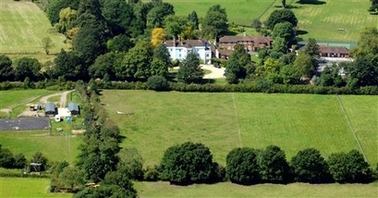Foot-and-mouth disease found in UK
(AP)Updated: 2007-08-05 09:01
WANBOROUGH, England - Britain raced to avert economic disaster Saturday by halting meat and dairy exports and the movement of livestock around the country after foot-and-mouth disease was found on a southern English farm.
 An aerial view of a farm on Westwood Lane in Normandy, Surrey southern England where an outbreak of foot and mouth disease has been discovered in a heard of sixty cattle, Saturday Aug 4, 2007. [AP]  |
The strain of the highly infectious disease found was identical to one used at a nearby government-funded laboratory that is researching vaccines for the virus, Britain's environment agency said Saturday. Officials are still investigating other possible sources, the country's chief veterinarian said.
Prime Minister Gordon Brown vowed to work "night and day" to avoid a repeat of a 2001 outbreak, when millions of dead animals were burned on pyres, swathes of the countryside were closed, rural tourism was badly hurt and British meat was shut out of international markets.
"Our first priority has been to act quickly and decisively," Brown said. "I can assure people ... we are doing everything in our power to look at the scientific evidence and to get to the bottom of what has happened and then to eradicate this disease."
The Department for Environment, Food and Rural Affairs, or DEFRA, said Britain had banned the export of live cattle, pigs, sheep and goats, as well as carcasses, meat and milk.
The United States and Japan immediately banned British pigs and pork products in response to the outbreak. British beef is already banned in both countries because of mad-cow disease.
The European Union was also likely to announce a ban on British livestock imports in the 27-nation bloc when its executive body meets on Monday.
British authorities also imposed a nationwide ban on transporting cattle, sheep, goats and pigs in response to the outbreak.
Foot-and-mouth disease causes fever and blister-like lesions on the mouths, teats and hooves of affected animals. It can be deadly in livestock but is harmless to humans.
Although many animals recover, the disease leaves them debilitated, causing major losses in meat and milk production.
DEFRA said animals on a farm near Wanborough, about 30 miles southwest of London, had tested positive for the disease, which affects livestock but not humans.
The strain of the disease was the same as one used at the Institute for Animal Health's Pirbright Laboratory, which is about four miles from the affected farm.
Authorities have asked the lab to review its biosecurity procedures, the government's chief veterinarian, Debby Reynolds said. Reynolds ordered a new six-mile protection zone to be set up around the farm and the lab.
The strain detected in the outbreak is not one recently found in animals, DEFRA said.
Indications the virus came from the lab suggest the problem could be contained, said Andrew Biggs of the British Cattle Veterinary Association.
"The proximity of this farm to Pirbright was too much of a coincidence," he told British Broadcasting Corp. television. "We know where it comes from now, but there are still chances of it spreading. ... I don't think we can let our guard down."
No one at the laboratory returned a phone message seeking comment Saturday.
Officials did not specify how many animals at the farm were infected, but said all livestock on the farm were slaughtered and incinerated.
Scientists were trying to determine if vaccinations could be used to try to halt the spread of the disease.
The government was criticized for not using vaccines to try to fight the 2001 epidemic. A report on that outbreak by a senior scientific body, the Royal Society, concluded that vaccinations should be a major tool of first resort in the event of future outbreaks.
Reynolds said it was too soon to determine how far the disease may have spread.
Reynolds said there had been a small number of reports of signs of illness among livestock on other farms in the country, but none had so far proved to be foot-and-mouth disease.
Farmers near the infected site said they were hopeful quick action would contain the disease.
|
|
|
||
|
||
|
|